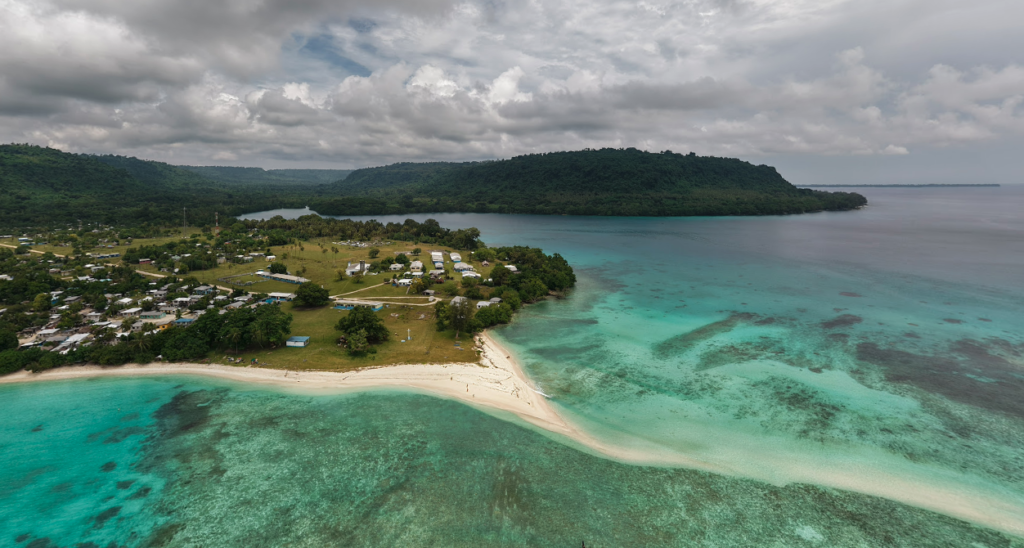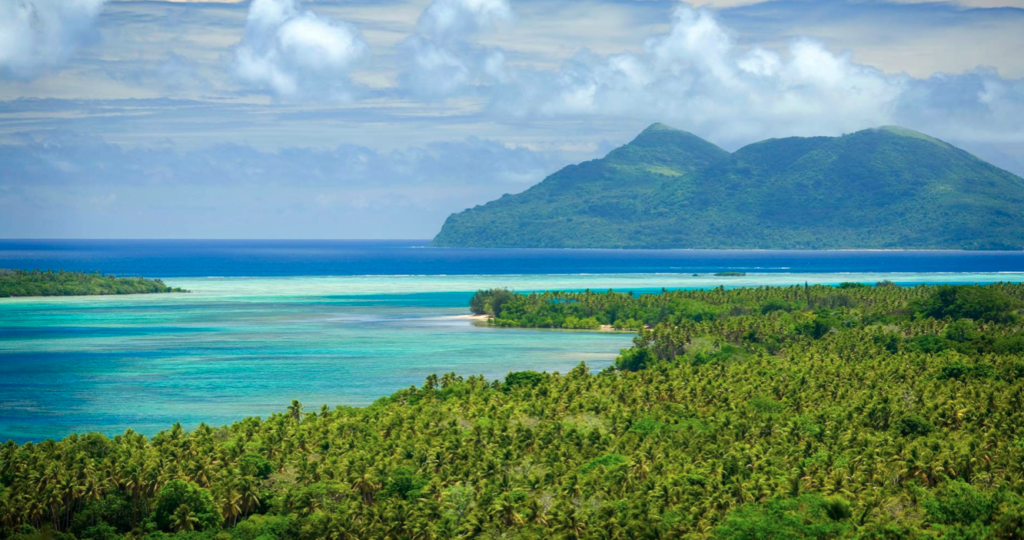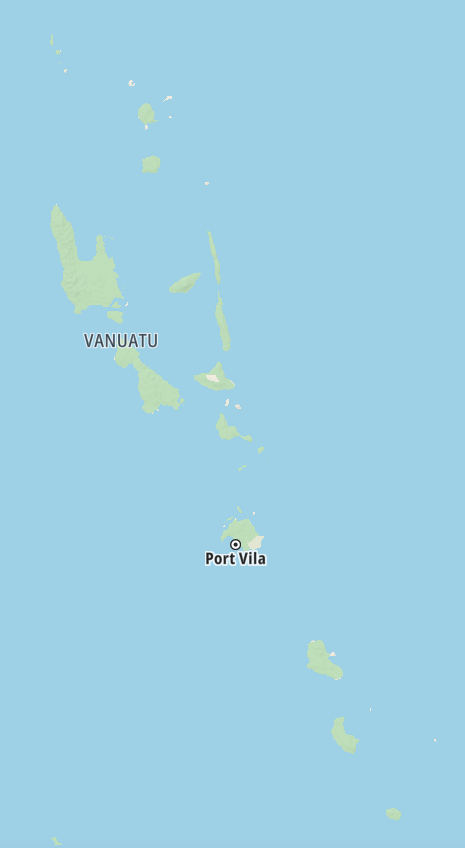Vanuatu / Republic of Vanuatu / République de Vanuatu / Ripablik blong Vanuatu – Let’s explore here
What’s it like in Vanuatu?
Vanuatu is located in Polynesia in the Pacific Ocean, west of Fiji, south east of the Solomon Islands and north east of Australia. It is an archipelago consisting of about 83 small volcanic islands, 65 of which are inhabited. They are spread over about 810 miles (1,300 km) north to south. Much of the coast is rocky and plunges rapidly into the deep ocean.
The population of Vanuatu is around ⅓ million people (2023), about 50,000 of whom live in the capital, Port Vila.
The highest point is Mount Tabwemasana, on the island of Espiritu Santo, the largest island in the country. The peak rises to 6,165 ft (1,879 m) above sea level.

A bit about the history of Vanuatu
Early Settlement and History
Vanuatu, located in the South Pacific, was originally settled by Austronesian-speaking peoples around 3,000 years ago. These early inhabitants developed a unique culture with a complex system of languages, customs and traditions. The archipelago consists of over 80 islands, and its early societies were primarily organized around small, independent villages.
European Exploration and Contact
European exploration began in the 17th century when Dutch and Spanish explorers first arrived in the region. However, significant European contact began in the 18th century, when British and French navigators arrived. During this period, the islands were known as the New Hebrides.
Missionaries and Colonial Era
Missionaries began arriving in the 19th century, bringing Christianity to the islands and influencing local cultures. In the late 19th century, the British and French established a joint colonial administration in the New Hebrides, leading to a period of tension between the two powers, as well as between the colonisers and the indigenous people. The joint British–French administration, known as the Condominium, lasted from 1906 until Vanuatu’s independence in 1980.
Push for Independence
Throughout the 20th century, the people of Vanuatu increasingly sought self rule and independence. Movements advocating for political and economic autonomy gained momentum, especially after World War II, as decolonisation swept across the Pacific. In 1977, Vanuatu’s independence movement was formalized under the leadership of political figures who advocated for the country’s sovereignty.
Independence and Modern Era
Vanuatu gained independence on July 30, 1980, becoming a sovereign state. It adopted the name Vanuatu, which means ‘Our Land Forever’ in the local language. The country established a parliamentary democracy, with a president as the head of state and a prime minister as the head of government. Vanuatu’s government has since worked on improving infrastructure, health and education, although it remains heavily reliant on agriculture, tourism and foreign aid for its economy.
Contemporary Challenges
Vanuatu continues to face challenges, including vulnerability to natural disasters such as cyclones, volcanic eruptions and earthquakes due to its location in the Pacific ‘Ring of Fire’. The country is also working on improving economic development, addressing environmental issues, and protecting its cultural heritage. Vanuatu is an active member of international organisations, such as the United Nations, and continues to advocate for climate change action, given its susceptibility to rising sea levels and extreme weather events.

Vanuatu road trip
Map of Vanuatu

We haven’t finished our planning for our road trip through Vanuatu yet. When we do though, we’ll post it here, and in the blog.
Hopefully our journey will improve our knowledge of this intriguing and beautiful country, and enable us to meet some interesting people. We’ll be updating this page at that time – don’t forget to check back 🙂
What’s it like to drive in Vanuatu?
They drive on the right hand side of the road in Vanuatu.
We’ve also created a dedicated page to driving abroad, which you might find helpful 🙂
What currency do they use in Vanuatu?
In Vanuatu they use the Ni-Vanuatu vatu. The use of credit / debit cards is not widespread, you should take cash in more remote areas. Travellers cheques are not widely accepted. There are a few ATMs in major tourist areas only.
You should make yourself aware of the amount that your bank charges you for using credit and debit cards abroad. Often credit cards are cheaper for purchasing items directly, and for withdrawing cash from ATMs.
What language do they speak in Vanuatu?
They speak English, French, and Bislama in Vanuatu, although there are many other recognised languages.
What time zone is Vanuatu in?
Remember, when you’re planning your next trip to take a look at what time zone it’s in.
Do I need a visa to visit Vanuatu?
We’ve created a dedicated, more comprehensive page on visas, which you should find helpful. Check it out!
Is wild camping legal in Vanuatu?
Yes, wild camping is fine in Vanuatu.
What plug / socket type do they use in Vanuatu?

In Vanuatu they use plug / socket type I.
Health issues in Vanuatu
Is it safe to drink water in Vanuatu?
No, it is not safe to drink tap water in Vanuatu. Bottled water is readily available throughout the country.
What vaccinations are required for ArgeVanuatuntina?
This NHS website is kept up to date with all relevant information on vaccinations in Vanuatu.
Phones in Vanuatu
What is the country calling code for Vanuatu?
The country calling code for Vanuatu is +678
What are the emergency phone numbers in Vanuatu?
- The emergency number for police in Vanuatu is: 111
- In Vanuatu, the emergency number for ambulance is: 112
- The emergency number for fire in Vanuatu is: 113
If you’ve got some useful info that you’d like to share, let us know!
And don’t forget to check out all the other pictures!
